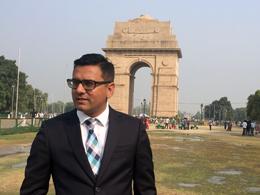Chef Sid cooks up a storm for India

By Mata Press Service
Siddharth Choudhary’s passion for food and the artistic display of his culinary creations propelled him to the top of Vancouver’s food scene.
Now something else is cooking in Siddhartha’s Kitchen, the popular East-Vancouver eatery.
It’s called ‘swarnimbharat.com’ – a concept to digitize democracy in India and dish it out liberally, in his homeland.
“I have always been passionate about food and politics…one gives life, the other often dictates how you live,” said the restaurateur.
Over the past two years, Choudhary has been quietly building swarnimbharat.com, which is to be India’s first digital political report card, where those elected to office at state and federal levels will be subject to scrutiny, accountability and review by the public.
“It will be like Trip Advisor or Yelp for Indian politics,” said Choudhary aka Chef Sid who plans to launch swarnimbharat.com early next year in time for two crucial state elections in India.
The task is gargantuan in the world’s largest democracy which has 1.25 billion people or 17.5% of the world's population; is home to 8 major religions and over 4600 castes and where the Federal Government recognizes 22 languages out of about 1,600 mother tongues in use.
Politically that translates into six national parties, 52 state parties and 1,112 registered but unrecognised parties.
On a federal level, swarnimbharat.com aims to give voters easy access to comment, rate and review every one of the contenders and incumbents for the 543 seats in the Lok Sabha or the lower house of India’s bicameral legislature. (Representatives to India’s Upper House - the Rajya Sabha – are elected by the members of State legislative assemblies).
At the State level, swarnimbharat.com, plans to document the performance for those aiming to occupy the 4,215 legislative assembly seats in India’s 29 states and seven union territories.
Once data-input is completed, swarnimbharat.com will have close to 5,000 indexed and easily searchable web pages, in addition to news feeds, video and audio content.
“Our objective is to be the most comprehensive data driven, citizen-powered political report card in India,” said Choudhary.
At the core of swarnimbharat.com is a tech team and a central editorial team helmed by a former BBC journalist who oversees a group of regional supervisors. The regional supervisors collate and check content from an army of volunteer citizen contributors.
So who is paying for all this digital purification of Indian politics?
For now, Choudhary is financing the project on his own.
“As we go along, we will be seeking some assistance from foundations and institutions who are keen on promoting democracy globally,” said Choudhary, adding swarnimbharat.com under the Canada-registered not-for-profit enterprise – World Democracy Index - is about 80 percent built.
“Our plan is to showcase its engagement and effectiveness in the upcoming Punjab and UP (Uttar Pradesh) state elections.
“The people's role in a democracy should not just end at the voting booth…swarnimbharat.com will empower the voter with a robust database to keep track of political promises and government policies,” said Choudhary, adding “because without citizen participation, accountability and transparency there is no democracy.”
Stewart Beck, president and CEO of the Asia Pacific Foundation of Canada described India’s democracy as “vibrant, open, and remarkably chaotic”.
“Having a platform like swarnimbharat.com will certainly allow people the opportunity to air their own views and opinions and compare and contrast them with the opinions of others,” he said.
“From my own perspective, and I served as Canada’s High Commissioner to India for four years, if you have 10 Indians in a room you won’t find two agreeing on anything — such is the nature of India's passion for dialogue and debate. A platform that actually allows you to collate attitudes and opinions will be refreshing, and very useful,” said Beck.
Ujjal Dosanjh, Canada's first Indo-Canadian provincial leader and former Health Minister of Canada, said any project like swarnimbharat.com that makes politics in India more transparent will be more than welcomed.
“There is not much transparency and accountability in Indian politics and a significant number of politicians there are corrupt,” he said.
“This project if it sheds light on those in office and seeking office will be a wonderful addition to the democratic process in India.”
Md. Nadimul Haque, India’s upper house Member of Parliament for West Bengal, praised the initiative saying that the swarnimbharat.com portal “will empower citizens by creating a pool of knowledge and will make their representatives accountable to them.”
Firoj Khan, editor-in-chief of Action Bindas News, an Indian Media Network, congratulated swarnimbharat.com for creating a platform “for anyone from the entire country to select, vote, criticize and analyze the performance of his/her political candidate”.
Ved Amrita, a Norway-based philanthropist said the common people of India are forced to roam around seeking help from their MLA, MP and local politicians.
“But generally all they get is disappointment,” he said in a telephone interview.
“This platform will be a great help as it's going to create portfolio for each and every politician where people can come and file their complaints, praise and seek help,” he said.
“I would definitely like to participate in it.”
Hamraj Singh, an independent media researcher, said there is no digital platform like swarnimbharat.com in India or for that matter anywhere else in Asia currently.
“I am excited about this because it allows people the freedom to vote, not once every five years but exercise their democratic rights any day and any time, based on the performance of their MLA or MP,” he said.









